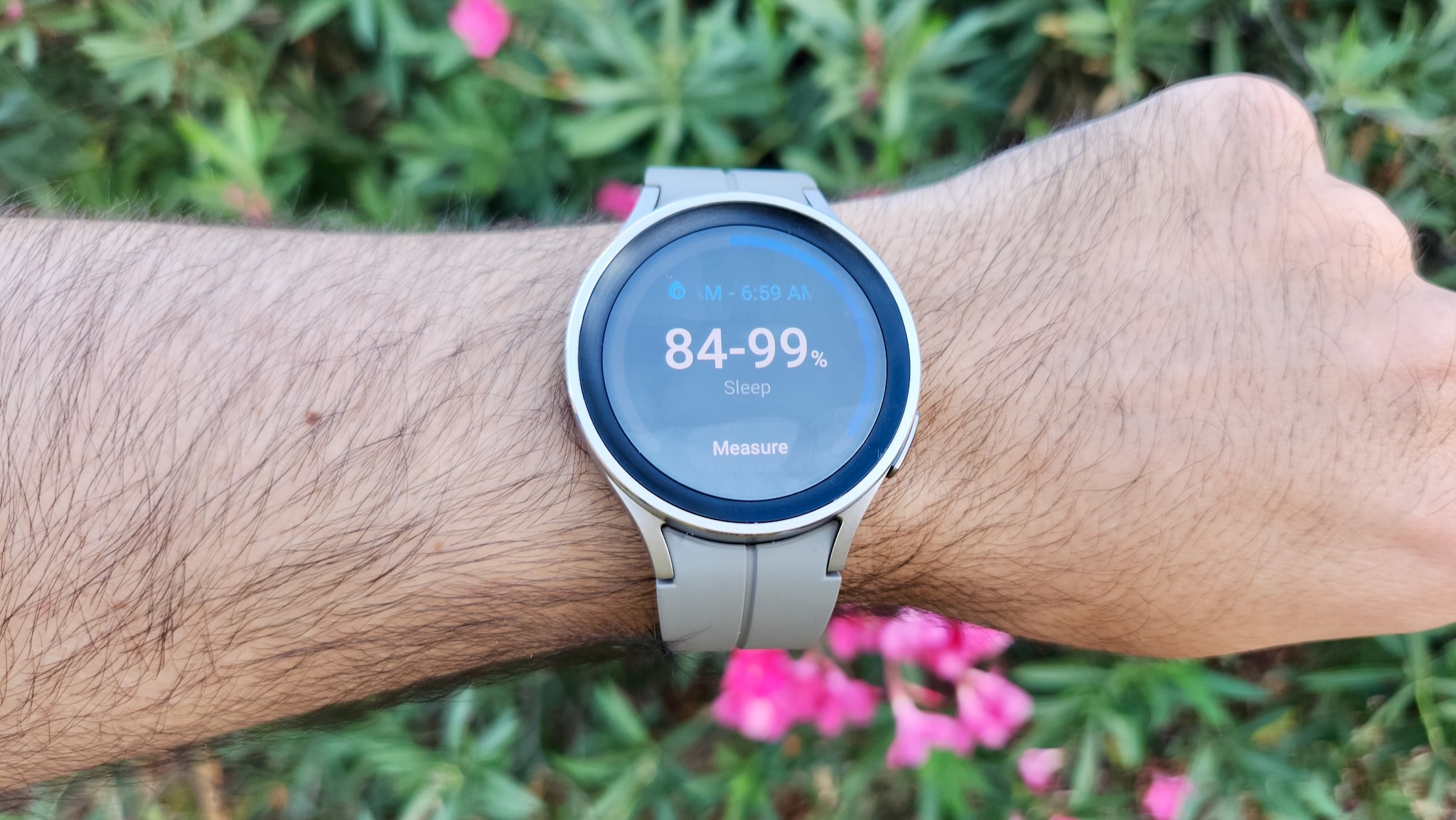Meta Quest 3 128GB vs. 512GB: Which storage size do you need?
With 512GB now being the default option at a lower price, is the 128GB variant still worth pursuing?
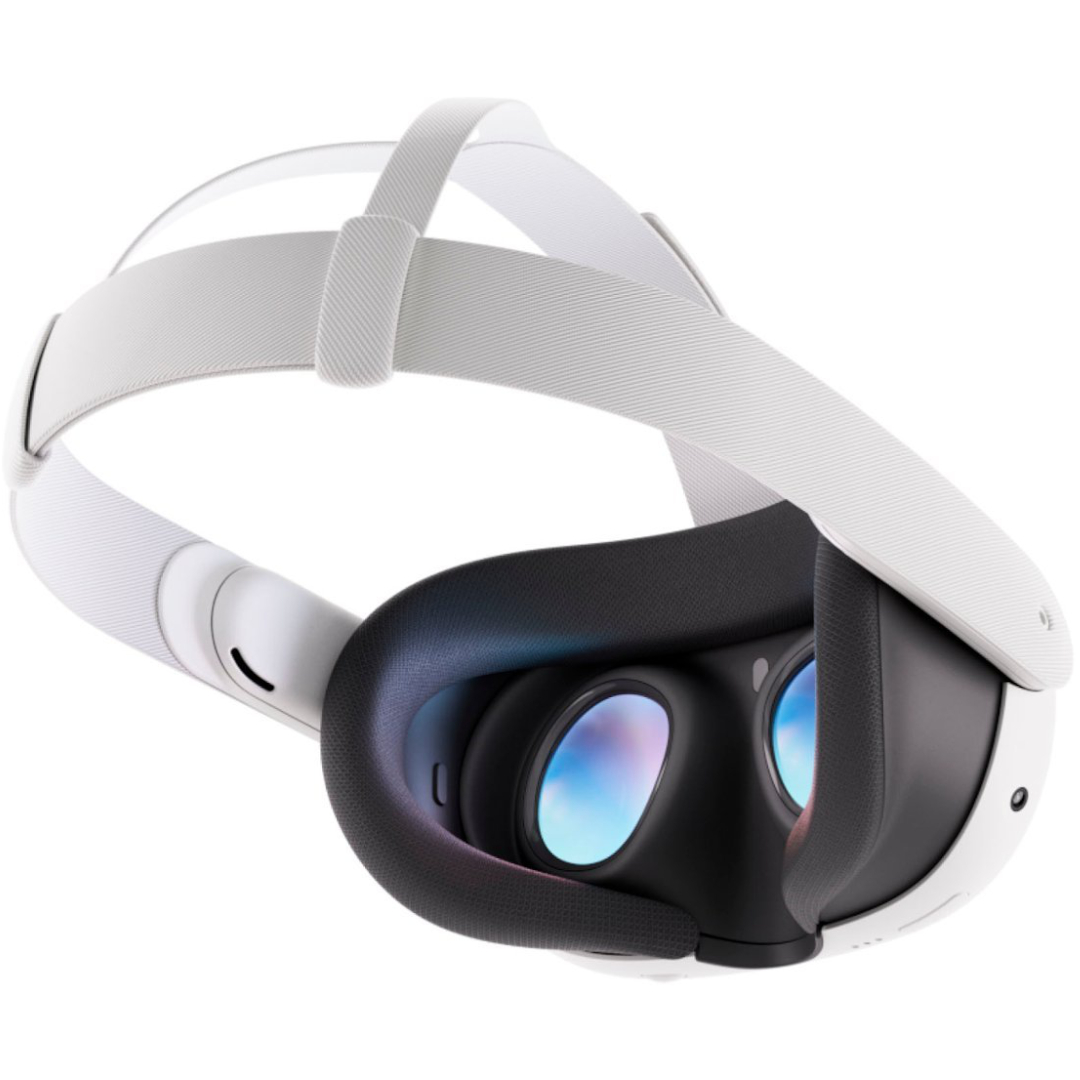
Basic buy
With the same amount of storage as the base Quest 2, the base variant of the Meta Quest 3 should fit your current VR library when you upgrade. With the launch of the 3S though, Meta has officially discontinued the 128GB variant which makes it harder to find brand-new, unless you don't mind buying one that's refurbished.
Pros
- More affordable
- No other spec downgrades compared to 512GB
- Enough space for dozens of games
Cons
- Same storage size as Quest 2
- Quest 3 games will get larger over time
- Officially been discontinued
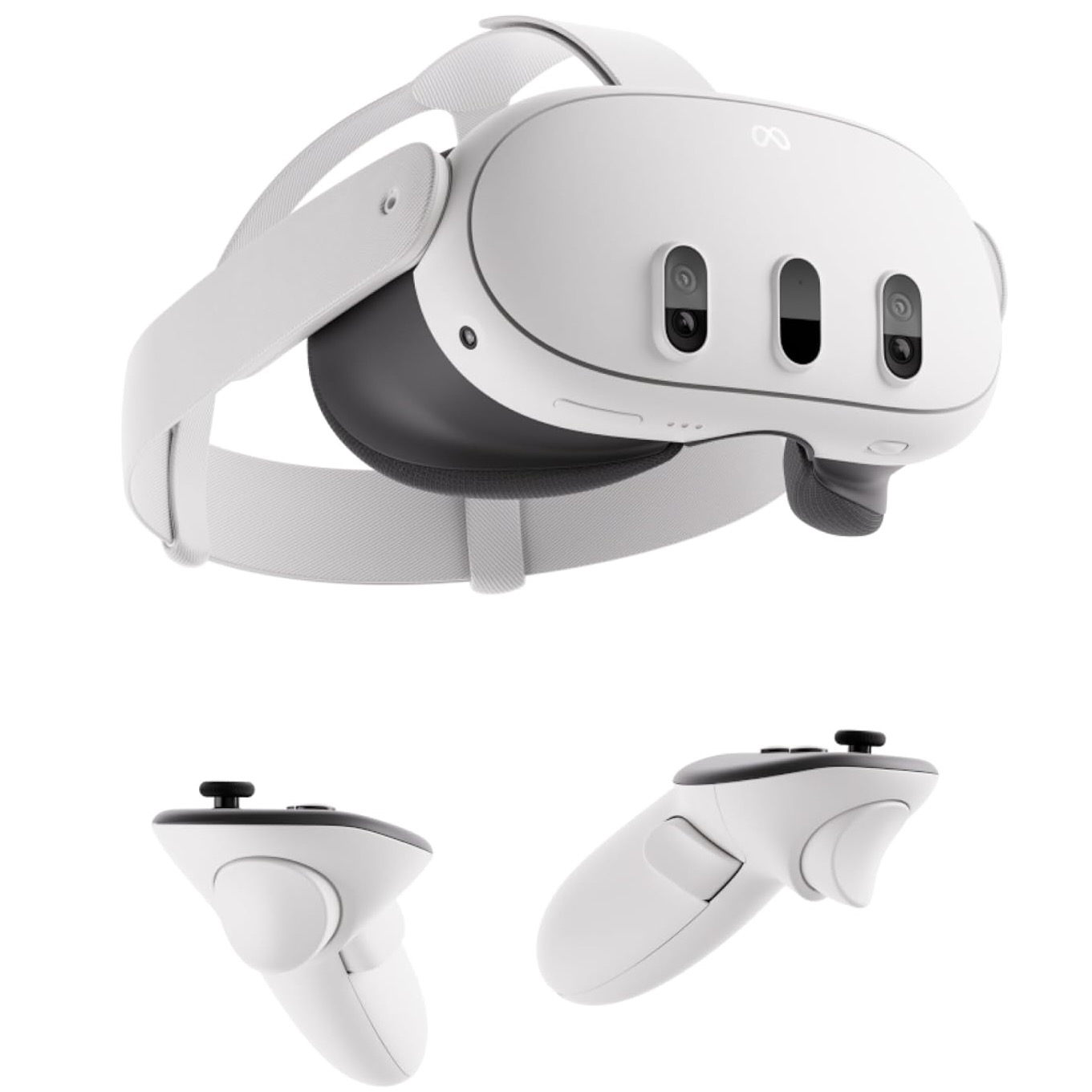
Future-proof choice
Get quadruple the Quest 3 storage, or twice what the largest Quest 2 offered. Game sizes are getting larger over time, and since Quest headsets don't have expandable storage, this is your best option to avoid constantly deleting or reinstalling games. This is now the only option when buying new and it even gets a lower price of just $499.
Pros
- Quadruple the storage
- Future-proofs the headset for larger titles
- Comes with 3 months of Meta Quest Plus, Batman: Arkham Shadow
- Price lowered to $499, making it a good deal
Cons
- No hardware differences besides storage
The Meta Quest 3 128GB model launched at a higher price than its Quest 2 predecessor in exchange for significantly upgraded specs. In September 2024, Meta remedied this by dropping the 128GB variant and lowering the price of the 512GB model to the original $499 price. This came as a pleasant surprise as it's rare to see big price corrections like this outside of a major sale.
While the Quest 3 512GB may have sounded excessive to casual VR fans, Quest game sizes keep getting larger as they take advantage of the extra graphical power, and you might be surprised how quickly the storage fills up.
Meta discounted the Quest 3 128GB to $429 to clear out stock, but as of December 2024, it's no longer available (that we could find) outside of refurbished headsets. The only 128GB headset left is the $299 Quest 3S, and you should look at our Meta Quest 3 vs. 3S guide for that decision.
Meta Quest 3 128GB vs. 512GB: What's the difference?
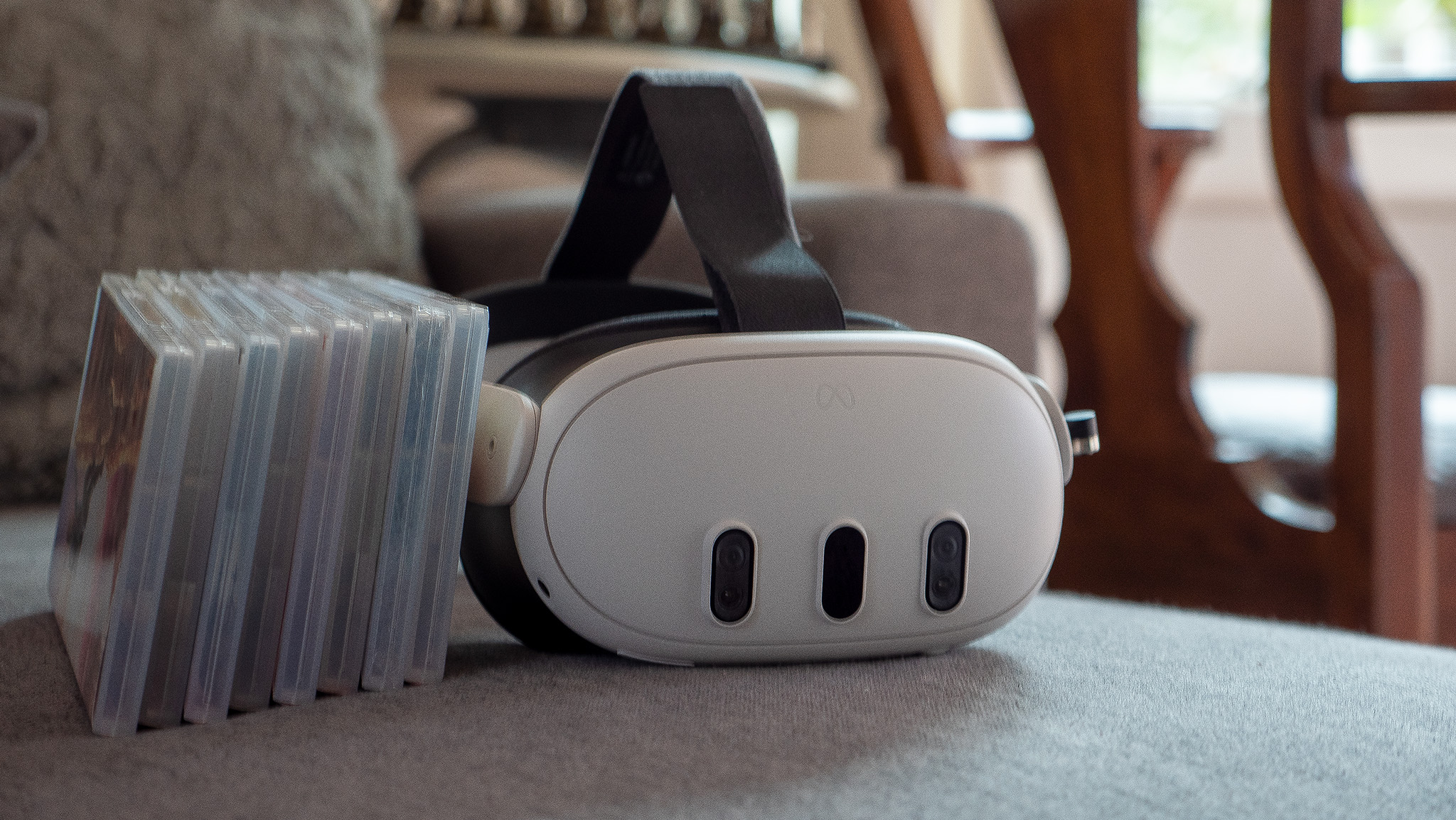
There is no hardware difference between the Quest 3 128GB and 512GB, aside from storage space. We heard rumors prior to launch that Meta would sell a higher-end Quest 3 with extra storage and 12GB of RAM, but this turned out to be incorrect. Either storage size offers the same 8GB of memory, pancake lenses, high-res LCD, two hours of battery life, and game library.
In terms of actual storage space, you don't get the amount listed on either box due to preinstalled operating system files. In the storage settings, the Quest 3 512GB lists 481GB as the maximum storage size. Oddly, the 128GB model still lists 128GB as the max, but it shows about 20GB of System files in the Storage graph. In truth, you have just over 100GB of space.
Originally, Quest 3 128GB purchases got you a free game copy of Batman: Arkham Shadow, while the Quest 3 512GB gave you the game and a three-month free trial to Meta Quest Plus, a $7.99 monthly subscription offering two downloadable games per month, selected by Meta. Now, the only new option is the 512GB, which still comes with both perks.
Meta Quest Plus has a catalog of nearly 30 games that collectively would cost you hundreds of dollars, giving you a great starter pack for VR. Plus you get popular monthly games that stick in your library as long as you're subscribed (and return if you resubscribe). If you take full advantage, this is a really nice perk of buying the new 512GB headset.
Get the latest news from Android Central, your trusted companion in the world of Android
Meta Quest 3 128GB vs. 512GB: Quest 3 game sizes
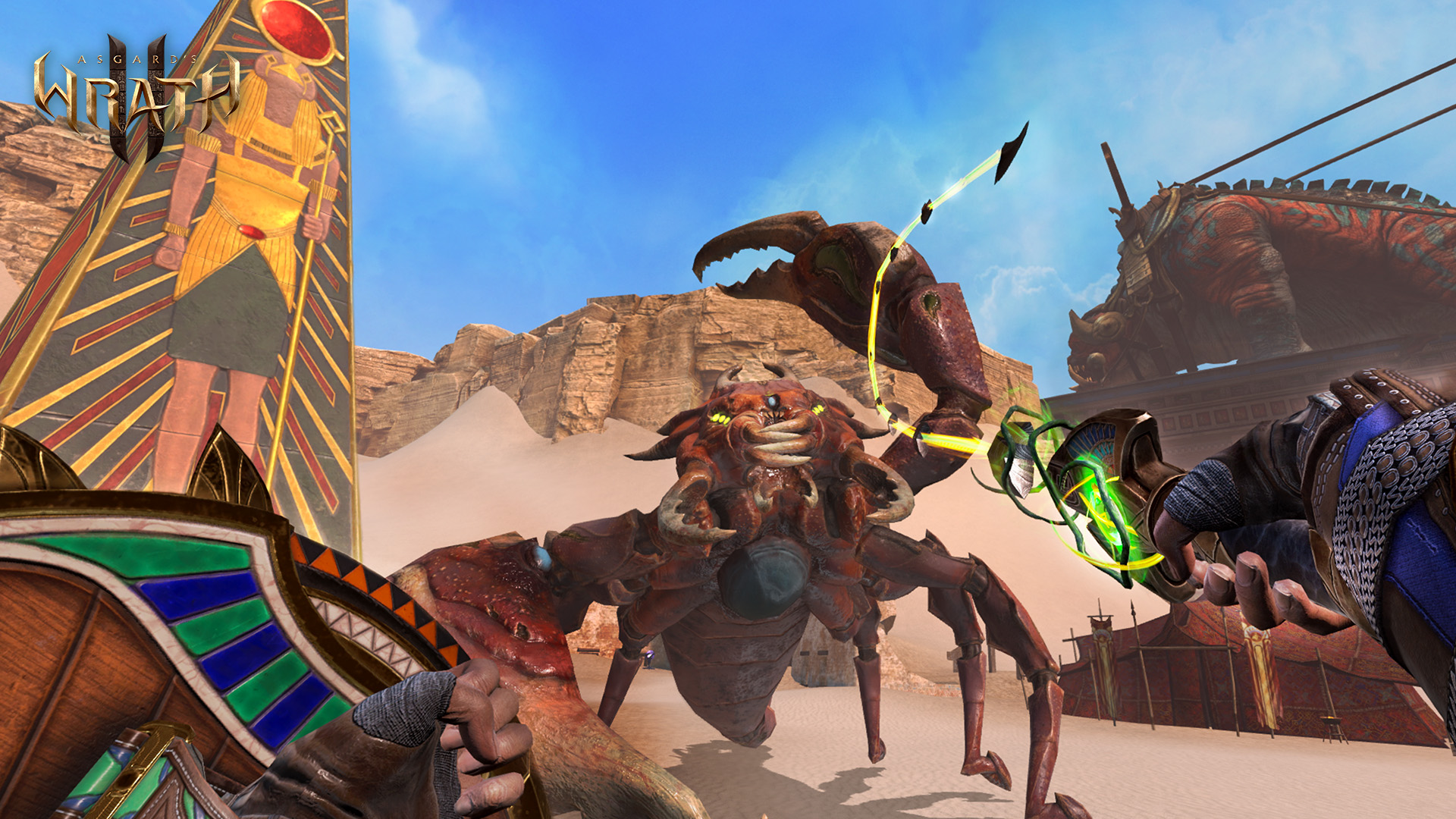
Do you need more than 100GB of storage space? That's the question at the heart of your Quest 3 128GB vs. 512GB decision. And to answer that question, we need to determine how much space Quest 3 games actually take.
Looking at 50 Quest Store games released between May and October 2023, they add up to about 107GB in total, or 2.14GB per game, according to the "Space Required" field on each store page.
Next, we added up the 40 top-selling Quest Store games as of October 2023: they totaled 144GB or 3.6GB per game.
Lastly, AC editor Nick Sutrich, who reviewed the Meta Quest 3, shared the photo below of his current storage. He informed me that he has 45 games installed, which take up 122GB of space — averaging just under 3GB per game, with the top seven games taking up nearly 60GB on their own.
If he owned the 128GB Quest 3, he'd have needed to delete a few games from his library, and he couldn't buy any more upcoming Quest 3 titles without blowing up his current list.
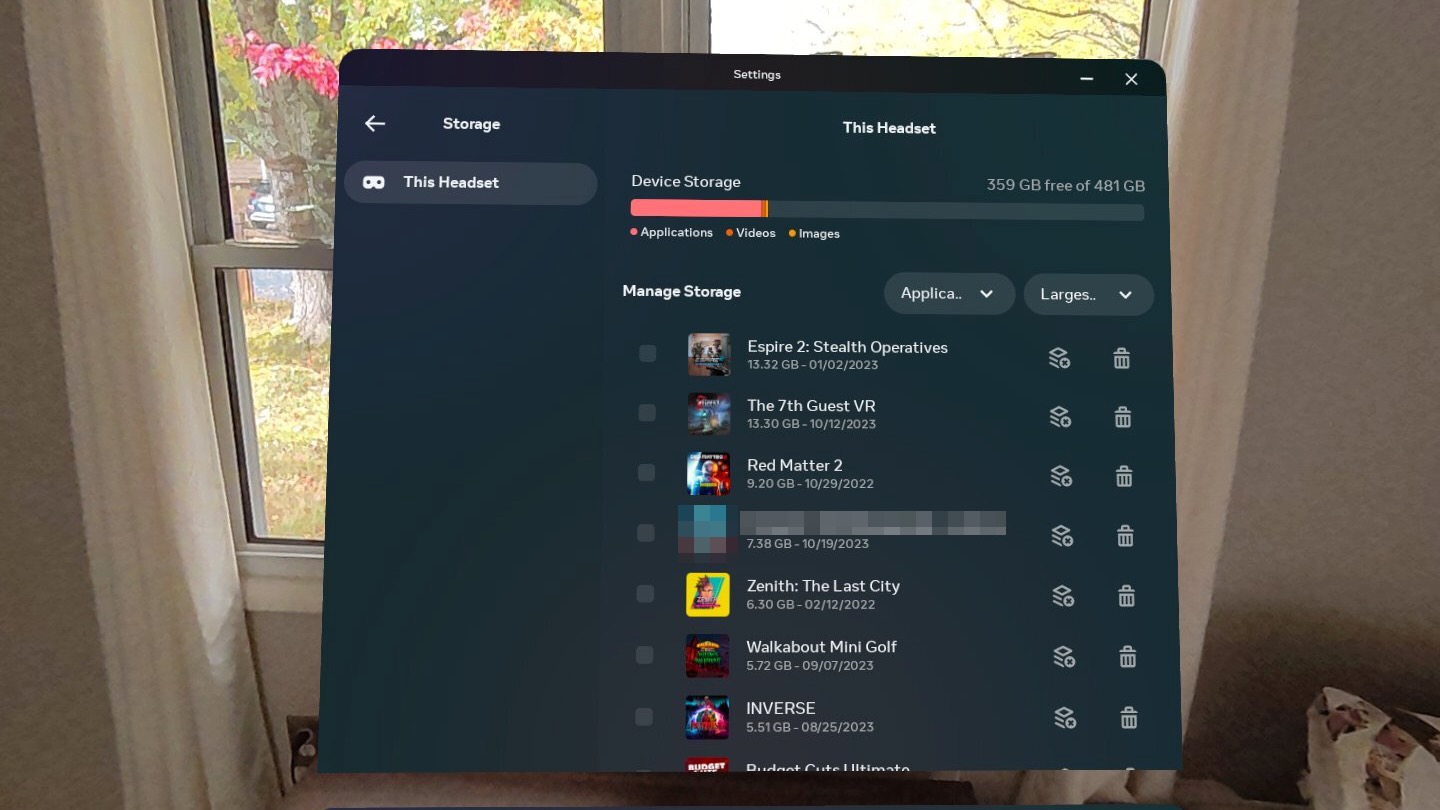
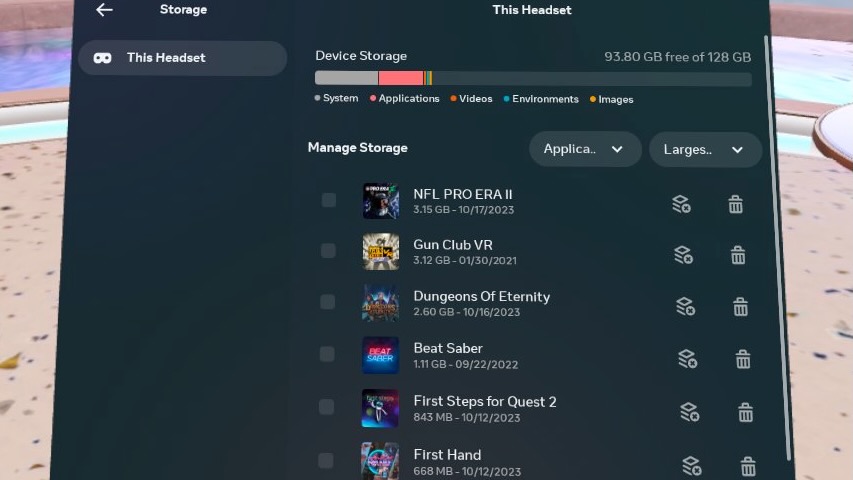
There are a few key lessons to learn from this data.
First, most Quest 3 games are small, even the most recent ones. Their sizes will bloat slightly over time — especially with games like Beat Saber with lots of DLC — but you can typically fit a few dozen games on the 128GB Quest 3 before you have to start worrying about culling your list.
Second, the most popular Quest 3 games tend to be bigger, corresponding to better graphics, audio, and mechanics. For every Roblox (0.2GB) or Gorilla Tag (0.75GB), there's a Contractors (9.6GB), Red Matter 2 (8.5GB), or Iron Man (9GB).
And third, the games' actual storage space is larger than what the Quest Store lists. For example, store pages state that The 7th Guest and Espire 2 both take up about 12.3GB, but they both show 13.3GB on Nick's storage page. We can assume this gap stems from post-launch updates and Quest 3 enhancements.
Taken all together, these lessons teach us that you can make do with the 128GB Quest 3 and have plenty of games stored, but that just a few high-quality games will take up a huge portion of storage. If you run out of space, it's these games that you'll probably end up deleting rather than removing a bunch of games that only claim 1–2GB on their own.
If you're frustrated at the very idea of managing which games you buy or download based on storage, or you already own a large Quest 2 library, then maybe the 512GB Quest 3 is the option for you.
Meta Quest 3 128GB vs. 512GB: The Quest 3 128GB is enough if you're careful
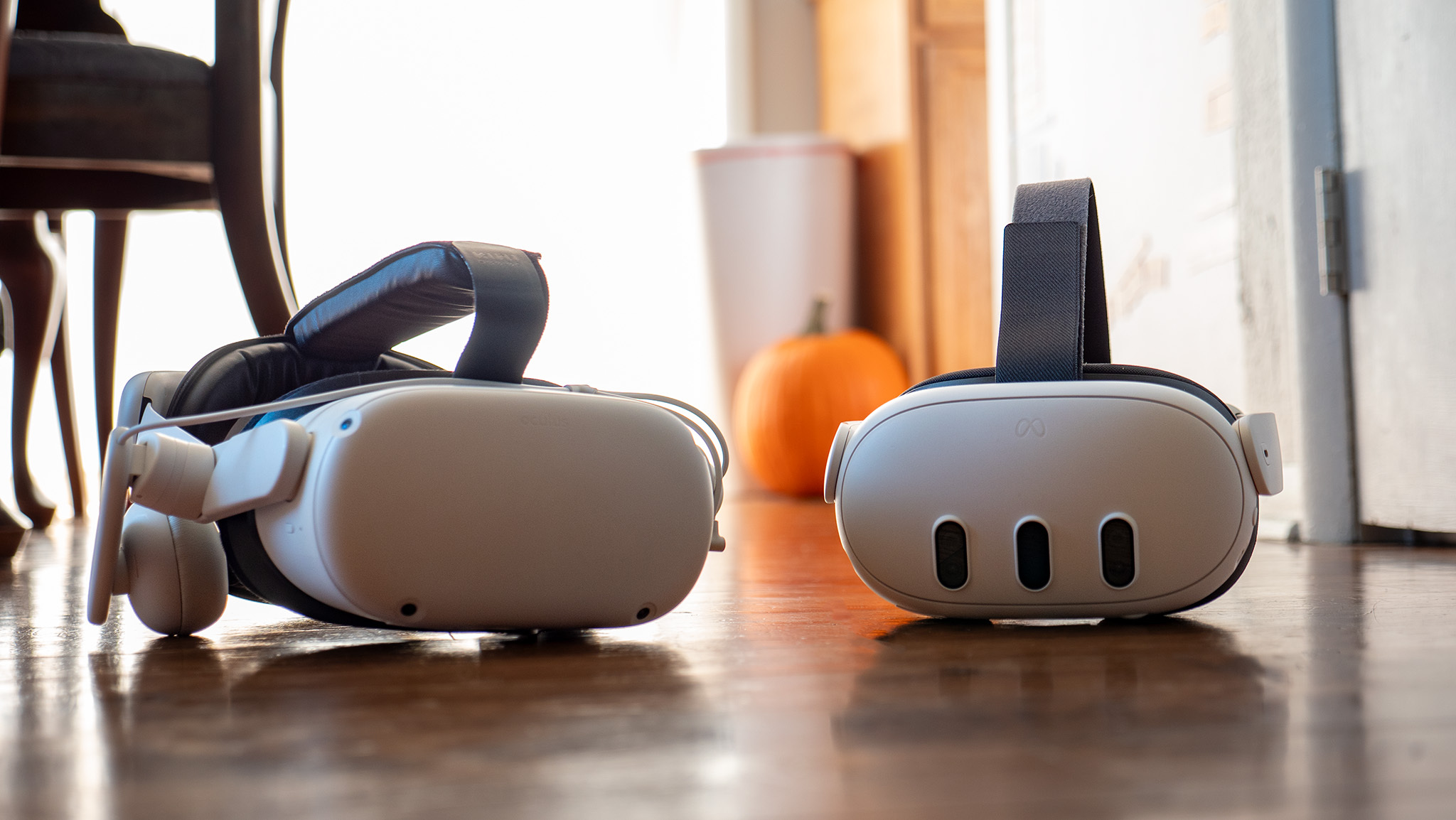
As someone who used the old 64GB Quest 2 and had to find space for dozens of games while reviewing them, let me assure you that you can make do with the Quest 3 128GB model (assuming you find one).
Meta didn't even add cloud saves until late 2021, so choosing which games to delete used to be a much harder decision when it meant losing all your progress. Now, it's simply a matter of waiting a few minutes to redownload something; I'm hoping that since the Quest 3 supports Wi-Fi 6E downloads, you won't have as long to wait, either.
Some games like Asgard's Wrath 2 and Assassin's Creed VR Nexus will take up a healthy chunk of storage space. But I doubt many games will hit the same 45GB threshold as Medal of Honor did — a game that couldn't fit on 64GB Quest 2 headsets. Meta has a vested interest in ensuring that all Quest 3 owners can buy the most popular titles, so it should encourage devs to keep storage sizes small.
If you're a new or lapsed VR gamer without a major Quest library or someone who can't afford to buy dozens of AAA Quest 3 releases in the first place, then you're probably fine with the smaller storage option. Even if you're an active VR gamer, you'll probably be fine if you don't mind deleting games once you've 100%-completed them, as I typically do.
The biggest problem, of course, is that you'll have to buy refurbished. But we usually recommend replacing the Quest 3's default strap and facial interface anyways, so you can replace the parts of the headset that touched someone else's face if you're worried. Our best Quest 3 accessories guide will help with that.
Meta Quest 3 128GB vs. 512GB: The Quest 3 512GB future-proofs the headset for massive games
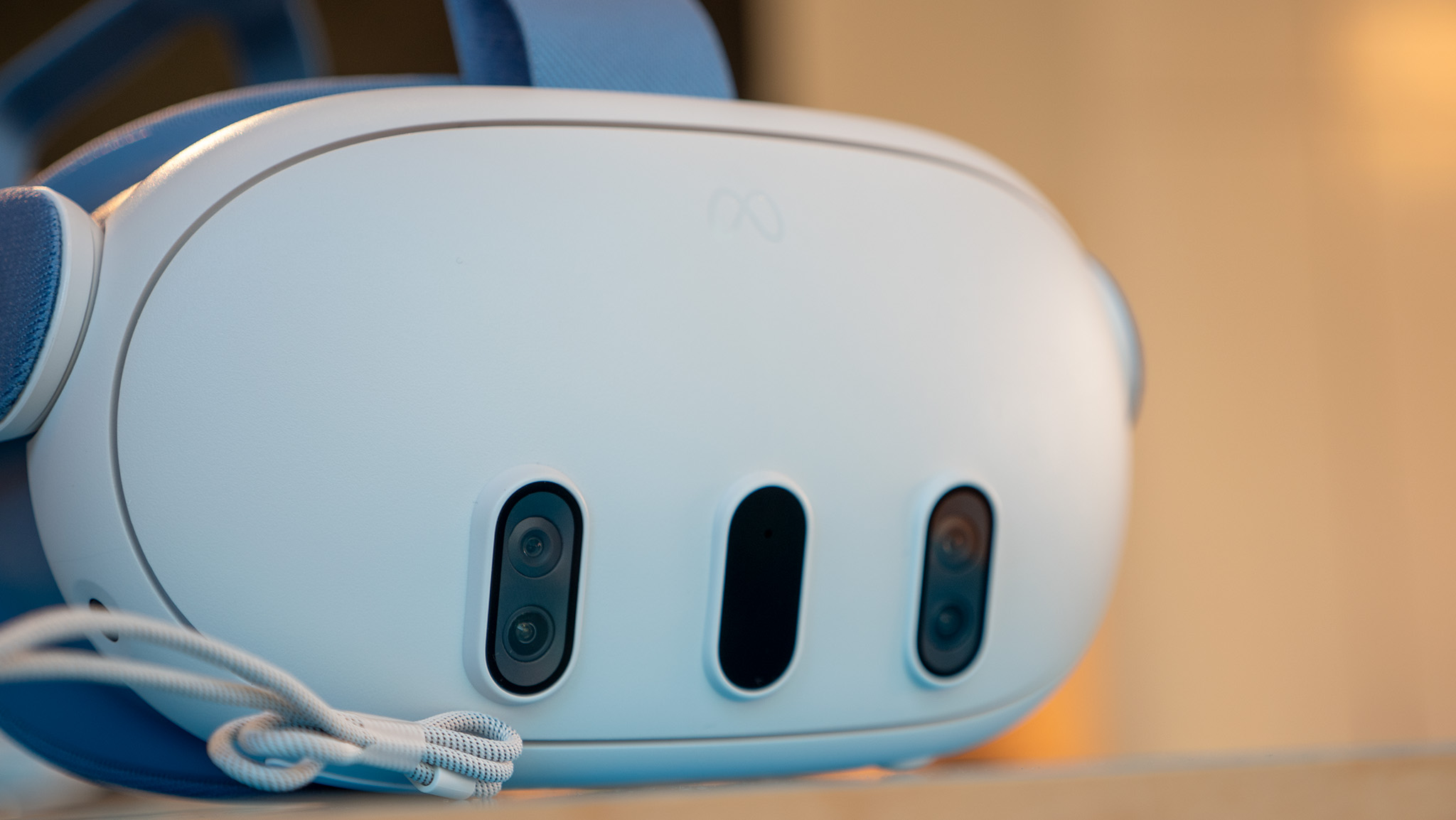
Quest games keep getting bigger with time. Meta made the 512GB variant the default for the Quest 3 because it wanted to differentiate it from the Quest 3S, but also because it allows developers to expand their game sizes without worrying that they won't fit on some headsets.
Let's assume that the average Quest 3 game size ends up closer to 5GB. That means you can probably fit about 20 games on the 128GB headset or maybe 30 games if you already have a library of smaller Quest 2 games. That's more than enough for some gamers, but my colleague Nick — who dives into VR worlds on a daily basis — would tell me that it definitely isn't enough for him.
Plus, some folks use sideloading to install custom apps for modding their favorite games or massive movie files for VR movie nights. If you're a tinkerer who wants breathing room for that kind of thing, then the 512GB Quest 3 gives you the space you need.
The bottom line is that the 512GB Quest 3 is currently the default option and is cheaper, making it a no-brainer for VR fans. If you're a casual VR gamer, then hunting down a deal for the 128GB makes sense if you can find it for $429 or less, or if you're tiding yourself over until the Quest 4. But otherwise, just take the extra storage! Personally, as a 128GB headset owner, I'm jealous.

Basic buy
Choose the 128GB Quest 3 if you're a new or infrequent VR gamer who'd rather get the best possible specs (compared to the Quest 3S) but doesn't mind buying refurbished. Don't choose this storage option if you already have a large Quest 2 library and don't want to compromise.

Future-proof choice
The 512GB Quest 3 is now the default choice and is priced lower. It's the one to get if you previously owned the 256GB Quest 2 and are accustomed to this level of storage or if you plan to buy a lot of AAA Quest titles. Don't choose it if you're on a budget; buy the Quest 3S instead.

Michael is Android Central's resident expert on wearables and fitness. Before joining Android Central, he freelanced for years at Techradar, Wareable, Windows Central, and Digital Trends. Channeling his love of running, he established himself as an expert on fitness watches, testing and reviewing models from Garmin, Fitbit, Samsung, Apple, COROS, Polar, Amazfit, Suunto, and more.
You must confirm your public display name before commenting
Please logout and then login again, you will then be prompted to enter your display name.
